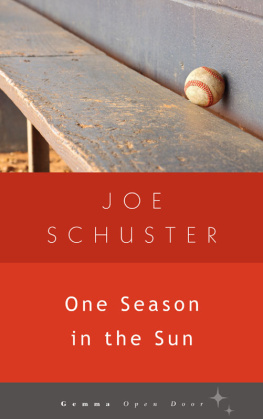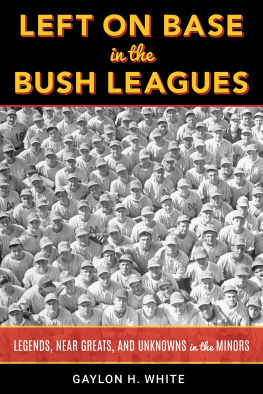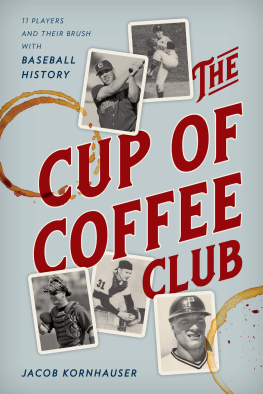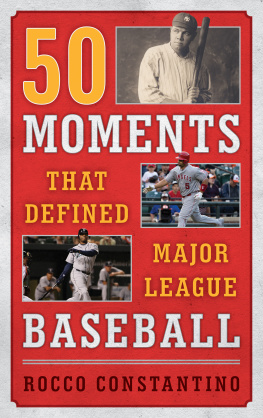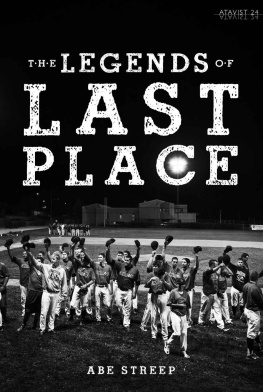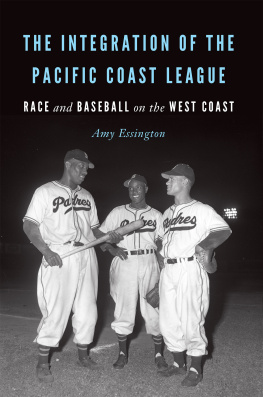
Joe Schuster
ONE SEASON IN THE SUN
Joe Schuster teaches at Webster University. His novel The Might Have Been was published in 2012. His short fiction has appeared in The Kenyon Review, The Iowa Review, and The Missouri Review, among others, and his articles have been published in USA Today, St. Louis Post-Dispatch and the revered, retired Sport.
First published by GemmaMedia in 2012.
GemmaMedia
230 Commercial Street
Boston, MA 02109 USA
www.gemmamedia.com
2012 by Joseph M. Schuster
All rights reserved. No part of this publication may be reproduced in any manner whatsoever without written permission from the publisher, except in the case of brief quotations embodied in critical articles of reviews.
Printed in the United States of America
16 15 14 13 12 1 2 3 4 5
978-1-936846-22-1
Library of Congress Cataloging-in-Publication Data
Schuster, Joseph M.
One season in the sun / Joe Schuster.
p. cm. (Open door)
ISBN 978-1-936846-22-1 (pbk.)
1. BaseballUnited States. 2. Baseball playersUnited States. 3. Buehrle, Mark. 4. Wise, DeWayne. I. Title. GV863.A1.S38 2012
796.357dc23
012027683
Cover by Night & Day Design
Inspired by the Irish series of books designed for adult literacy, Gemma Open Door Foundation provides fresh stories, new ideas, and essential resources for young people and adults as they embrace the power of reading and the written word.
Brian Bouldrey
North American Series Editor

Open Door
For Kathy and all my family, devoted baseball fans.
Contents
ONE
Three Innings and Gone
In 1964, when Dave Bakenhaster was nineteen years old, his life seemed like a story from a movie.
When he was eight, he became an orphan. Both his mother and father died within six months of each other. Bakenhaster went to live with one of his older brothers. He dealt with his grief by devoting himself to baseball. The boy promised his family that he would one day be good enough at the sport people called Americas pastime to play in the major leagues. By high school, he was one of the best teenage pitchers in the country. Over four years, he won forty games and lost only four. In his last two seasons, he struck out 461 batters in just 214 innings, a phenomenal number in itself. He threw nine no-hit games, and in one, struck out every batter he faced.
With such success, it is not surprising that when he graduated, almost every major league team joined a bidding war to convince him to pitch for them. The highest bidder was St. Louis. The Cardinals paid him roughly $40,000 just to sign a contract.
Although the amount seems small compared with the million-dollar-plus bonuses that talented ballplayers can earn now on signing, $40,000 was a large sum in the early 1960s. It was almost eight times what an average American worker earned for an entire year. You could buy a new two-bedroom home in a St. Louis suburb for $8,500 or a luxury three-bedroom home on a golf course for $20,000. A new Dodge sedan carried a price sticker of $1,800. Gasoline cost less than thirty cents a gallon.
Bakenhasters signing was so big that newspapers across the county published stories about the deal.
The next year, not even legally old enough to vote or drink, he reached the goal hed set not long after his parents died: Dave Bakenhaster was in the major leagues. On a hot and muggy late June afternoon in St. Louis, with more than 20,000 fans watching, he made his debut against the San Francisco Giants.
The Giants team was powerful. Five of its membersWillie Mays, Orlando Cepeda, Duke Snider, Gaylord Perry and Juan Marichalwould one day end up in baseballs Hall of Fame, the museum that honors the best baseball players in the games history. By the time Bakenhaster took the mound in the eighth inning, the Giants were already leading 101.
The first batter he faced hit a double, but Bakenhaster got the next two men to ground out. The fourth hitter was Willie Mays, one of the greatest baseball players in the history of the game. Bakenhaster threw a pitch that Mays hit on the ground to the shortstop. That should have been the last out of the inning, but the shortstop made an error and Mays was safe. The other runner scored. The Giants followed with two more singles, tallying two more runs, before Bakenaster finally retired them. He allowed one more run in the ninth inning.
A month later against the Pittsburgh Pirates, Bakenhaster appeared in his second game. He pitched an inning in another lop-sided loss and allowed two runs and three hits.
The next day, the Hollywood story ended.
The Cardinals sent him back to the minor leagues. Perhaps because he was disappointed that he had little chance in the major leagues, he pitched poorly for the rest of the year. He won only one game, lost six, and allowed more than five runs every time he was on the mound.
He did not play well in the next minor league season, but 1966, when he was a twenty-year-old in the class A Florida State League, he pitched as the professional scouts had expected he would. He finished the year with more victories than all but one other pitcher in the league and was among the league leaders in most other pitching categories.
It was not enough to help him get back to the major leagues. The Cardinals had other pitchers they were more interested in bringing along, like future Hall of Fame member Steve Carlton and future All Star Jerry Reuss.
Bakenhaster spent three more years in the minor leagues and then decided to retire as a player. The Cardinals offered him a job as a coach for the next year and he accepted. Less than a week after he agreed, however, he told the team he had changed his mind, citing personal reasons.
Dave Bakenhaster walked away from the game, at the young age of twenty-five, and went to work in a warehouse near the Ohio home where hed grown up.
TWO
Loving Baseball
When I was a boy, I wanted to be Dave Bakenhaster. I dont mean I wanted to be him, specifically, but someone like him. I was eleven the summer he spent his brief moment in the major leagues, and I imagined myself some years into my future playing baseball for the St. Louis Cardinals, my favorite team. On most nights throughout the spring and summer, I listened to their games on a transistor radio hidden under my pillow. I kept the volume low so my parents would not know I was tuned in when I was supposed to be sleeping.
I knew the names of the players in the starting lineup: Lou Brock, Bill White, Curt Flood, Julian Javier, and the others. My brother and I played wiffle ball in our backyard, alternating as pitcher and hitter. When I batted, I pretended to be one of the starting Cardinals, announcing to my brother who I imagined myself each time.
Every week, my parents gave me an allowance of twenty-five cents. As soon as I had the money, I walked to a drug store near our house and spent it all on Topps baseball cards. A package cost a nickel and contained five cards and a stick of pink gum coated in fine, white, powdered sugar. Each card had the glossy color photograph of a major league player on one side and, on the other, his batting or pitching statistics. At first, I kept the cards stacked in a shoebox. As I collected more and more, the shoebox became too small to hold them all. Then I stored them in a Styrofoam ice chest.
I spent hours reading those cards, the players numbers of home runs and strikeouts. I loved baseball so much, in fact, that my father taught me how to calculate percentages by showing me the formula for a players batting average: take the number of his base hits and divide it by the number of times he batted. Twenty-five hits in 100 at bats meant a .250 batting average. Thirty hits in 100 at bats meant a .300 batting average. I learned that even such a small difference in hits meant one player was great and another merely good. Or less than good. A player with a .300 batting average was great. A player with a .250 average was not. Subtract even a few more hits for every 100 times a player batted and he was fair or even poor.
Next page
